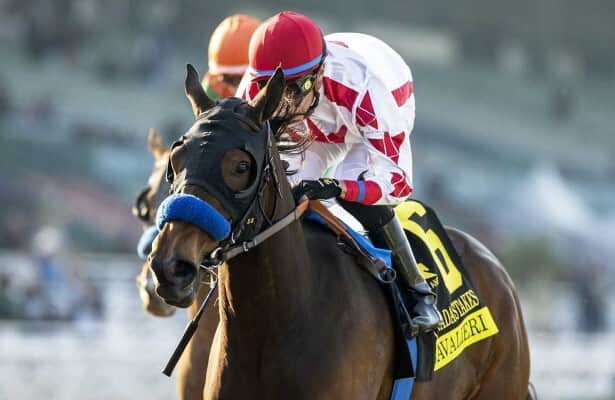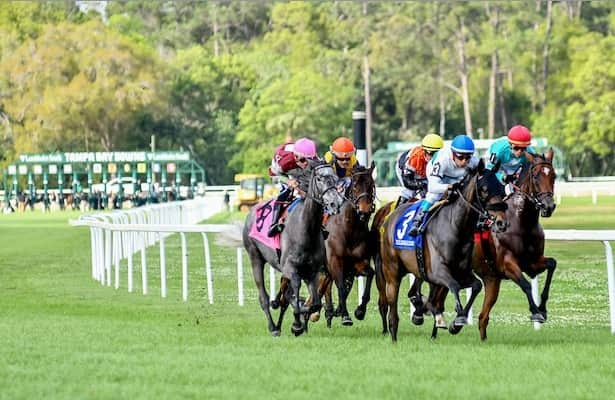Prix de l’Arc de Triomphe: Sosie leads quiet maestro André Fabre’s quest

When Jerry Bailey rode Arcangues, a 133-1 outsider, for André Fabre in the 1993 Breeders’ Cup Classic, he had no idea what the trainer looked like and could not find him in the pre-race scrum in the paddock. His initial ambition, he conceded later, was that he “just didn’t want to finish last”. But on the final turn for home, as he glided around the rail travelling more like an odds-on favourite, Bailey was already raising his sights considerably higher. “I thought I had a chance to win it,” he told an interviewer years later. “But a lot of times, you’ll be sitting on a horse and you think you have a bunch left. And when you ask the question, the answer’s no.”
As Bailey was about to discover, when a horse is trained by Fabre, the answer is generally yes. A 53,000-strong crowd at Santa Anita was about to learn the lesson, too. As Arcangues galloped straight past Bertrando, the front-running favourite, half a furlong from the line, the noise level in the grandstands went from 11 to zero in an instant as though the trainer himself had flicked a switch.
Thirty-one years later, Fabre is still the only European trainer to have won the US’s most valuable and prestigious all-aged race on dirt. He has also compiled a career record that stands comparison with that of any great trainer, from any era. He will saddle three runners in Sunday’s Prix de l’Arc de Triomphe at Longchamp, including the much-fancied Sosie, as he seeks a record-extending ninth win in the race, a success that would also all-but guarantee a 32nd domestic trainers’ title in 38 years.
And yet, to the sport’s fans, Fabre is still almost as much of a mystery man as he was to Bailey before the Classic. His public profile, such as it is, is almost entirely contained in the form book, where his achievements as a trainer are preceded by a successful spell as a jump jockey including a win in the Grand Steeple de Paris, France’s premier chase. He has little-to-no engagement with the mainstream media, even less with the social variety, and talks only about his horses on the rare occasions when he does.
“He’s an extraordinary man, no question about that,” Teddy Grimthorpe, the former racing manager to the powerful Juddmonte racing operation, said this week. “He’s dedicated, meticulous, fiercely competitive like all trainers. It’s not obvious, but it’s fairly near the top.
“He’s a superb horseman, he always has them looking fantastic, and he certainly has one of those great touches with horses. I think all the great, great trainers get inside horse’s heads, they know what they want and what they’re feeling. I think he certainly does that and he’s also able to assess them, so that he can train them accordingly.”
Fabre’s 40-year refusal to play the media game means that anecdotes, snippets and second-hand accounts inevitably fill some of the gaps. There is the story about his reaction in 1995 when Sheikh Mohammed of Dubai, the most powerful owner the sport has known, wanted to recruit Fabre’s colt Pennekamp, that year’s 2,000 Guineas winner, to his newly formed Godolphin operation. Fabre supposedly told him that he could do as he pleased – but if he took Pennekamp, the rest of his horses in the yard would need to leave too. Sheikh Mohammed had second thoughts.
Quick Guide
Greg Wood’s Saturday racing tips
Show
Newmarket 1.30 Min Huna (nb) 2.05 Twafeeg 2.40 Nashwa 3.15 Typical Woman 3.50 Wild Nature 4.25 Secret Theory 5.00 Princess Alex
Redcar 1.35 Thanks Angel 2.10 Legend Forever 2.45 Casilli 3.20 Northern Ticker 3.55 Northern Express 4.30 Cruyff Turn 5.05 Gibside 5.37 Our Absent Friends
Ascot 1.50 Rumstar 2.25 Al Qareem 3.00 Vadream 3.35 Golden Mind (nap) 4.10 Hopeful 4.45 JM Jungle
Southwell 4.05 Anthropologist 4.40 Sardinian Warrior 5.15 Marianglas 5.45 Murashah 6.15 Wonder Legend 6.45 Fiscal Policy 7.15 Maui Breeze 7.45 Bouvier 8.15 Apostle
Wolverhampton 4.20 Where Is The Love 4.55 Pine Cliffs 5.30 Flagon Dry 6.00 Magic Glow 6.30 Surveyor 7.00 Savalas 7.30 The Thames Boatman 8.00 Screaming Eagle 8.30 The Bobster
He is, and will probably remain, the only person to tell the ruler of Dubai that it’s my way or the highway and come out in front, and Fabre’s steadfast refusal to use race-day medication on his runners in the United States is the stuff of legend too. While many European stables adopted a “when in Rome” approach to drugs such as the anti-bleeding compound Lasix, Fabre just said no. Arcangues, like all five of the trainer’s Breeders’ Cup winners, ran “clean”.
It is a point-blank refusal to compromise on his principles that has kept Fabre at the pinnacle of his profession for nearly 40 years. John Hammond, a former assistant to Fabre who went on to train two Arc winners himself, has said that, if his former boss had not decided to train horses, “he would have been running a multinational company”.
But he chose horses, and a private, driven man who will celebrate his 79th birthday in December will instead be at Longchamp on Sunday, hoping to add an Arc in the 2020s to the eight earlier victories spread out over four preceding decades. And if or when a ninth Arc is in the book, he will probably move straight on to planning for a tenth.
Nashwa can pip retiring stable-mate Inspiral
Inspiral was a Group One winner at two, three and four years of age and if, as seems possible, she heads into retirement after the Sun Chariot Stakes at Newmarket on Saturday, she will do so as one of John and Thady Gosden’s all-time stable stars.
She put up a memorable performance to win this race 12 months ago, on the way to an even better performance to land the Filly & Mare Turf at the Breeders’ Cup. But she has not reached anything close to that level of form in three starts this season while her tendency to fall out of the stalls has become more pronounced.
Inspiral also faces a stronger field in this year’s race and makes little appeal at her likely odds of around 7-2. Tamfana, a progressive three-year-old from David Menuisier’s upwardly-mobile stable, is one live alternative, but Inspiral’s stable companion Nashwa (2.40) could be a bigger threat.
after newsletter promotion
Hollie Doyle’s mount has not seen a track since finishing ninth in the Dubai Turf at Meydan in March, but she has run well fresh in the past and has several runs in the book – including a close third in last season’s Irish Champion Stakes – that suggest she could outrun her odds of around 5-1.
Newmarket 1.30 The lightly raced Min Huna made a successful handicap debut with plenty to spare at Sandown in August and has more than enough scope for improvement to cope with an 8lb rise.
Ascot 1.50 Relief Rally, the warm favourite, was a Group Two winner as a juvenile but has failed to add to that in three starts this season and the 101-rated handicapper Rumstar could be overpriced at around 12-1 for his first start in Listed company this year.
Newmarket 2.05 Twafeeg is unraced since finishing around seven lengths behind the top-class Fairy Godmother at Royal Ascot in June but that form, on only her second start, is a match for anything her rivals can offer and she has more scope for progress than most of this field too.
Ascot 2.25 Karl Burke’s Al Qareem made all the running to land this Group Three contest 12 months ago and could repeat the trick as he faces no obvious competition for the lead.
Ascot 3.00 Vadream is on a 14-race losing streak but she has been a regular in Group One company, took this Group Three contest in 2021 and the ground has come in her favour.
Redcar 3.20 Low numbers generally have a significant edge over six furlongs here and the steadily progressive Northern Ticker looks sure to go well from stall three.
Ascot 3.35 A suitably competitive field of handicappers to chase a £93,000 first prize, and the lightly raced three-year-old Golden Mind, who posted a career-best off this mark at Doncaster last time, looks to be the pick of the early prices at around 11-1.
Related
Leading Parx jockey Sanchez will serve 7-day suspension
Photo: Jason Moran / Eclipse Sportswire Jockey Mychel Sanchez will serve a seven-day suspension and pay an additional $1,750 in fines
Bill Mott talks about plans for Sovereignty, Just F Y…
Photo: Gulfstream Park / Lauren King Sovereignty, dramatic late-running winner of the Fountain of Youth (G2) March 1, is being pointed
Up-and-coming Cavalieri chases Grade 1 glory in Beholder Mile
Photo: Santa Anita / Benoit Photo Cavalieri and Alpha Bella, who finished one-two in the Grade 3 La Cañada in January at Santa Anita,
4 stakes showcase shipping stars on Tampa Bay undercard
Photo: Gonzalo Anteliz Jr. / Eclipse Sportswire The stars will shine Saturday at Tampa Bay Downs, and not just in the Grade 3 Tampa Ba











